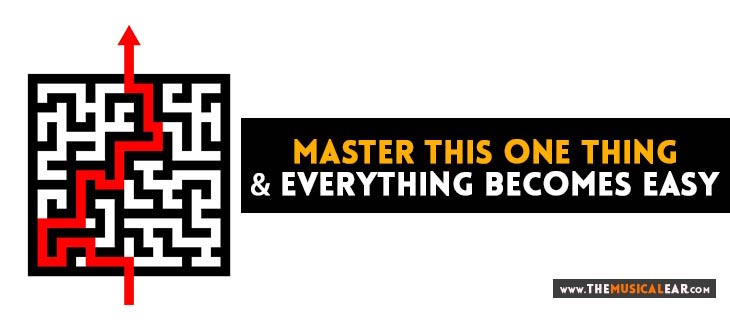
The ‘Holy Grail’ Of All Music Exercises:
Accompanying download for this lesson: Interval Trainer MP3 tracks.
As a musician, the one thing you’ll be doing on a daily basis, more than anything else – is measuring intervals.
Intervals are everything in music – as a creative player, you’re measuring out intervals all day long.
What is a chord voicing? It’s a stack of intervals.
What is a scale? It’s a series of intervals.
If you’re only interested in reading music, then that’s one thing. But if you want to understand music theory, compose your own music, play jazz, and become a truly great musician – then mastering intervals is essential – and the sooner you do this, the more it will pay off every time you play.
Why are intervals important?
To become a great musician, you have to be disciplined about intervals. This step cannot be skipped – you have to become ACCURATE – and FAST – at measuring them.
Every chord voicing is a stack of intervals.
Every scale is a series of intervals.
So the faster you can count intervals – the faster your playing will be.
And the faster you can count intervals – the less energy you’ll spend learning new concepts – you’ll ‘get it’ just like that.

How well do you REALLY know your intervals?
When I first meet with a new music student, my first question is always – “how are you with intervals?” (even before saying “how do you do” or anything else – I like to get straight to the point).
Usually the response is “pretty good” – but when I dive deeper, it turns out that most musicians are no where near confident enough, or quick enough, at measuring intervals.
I’ll go through a few quick questions – “what’s a minor 6th above F#?”.
Often they’ll get the right answer, but it takes a few seconds (which is too long).
OR – they’ll say the correct answer, but with a rising tone (as though asking a question) – “D?”
You need to be SO good at this – that you can answer any interval question in less than half a second – and without needing assurance that you have the right answer – you need to KNOW that you have the right answer, just as you KNOW that 2+2=4.
Other times, if we’re at the piano – I’ll watch their playing – and I can see that they’re not measuring the intervals with complete accuracy. They simply count out the numbers from the root – they might play a 7th up from the root – but they won’t be thinking ‘minor 7th’ or ‘major 7th’ – they just count up 7 notes, which isn’t accurate enough. We need to measure everything out to the semitone.
Are intervals holding you back?
If you haven’t yet mastered your interval arithmetic – then intervals are holding you back.
Intervals are like pixels on a computer screen – the more accurately you can measure intervals, the more accurate your picture of music will be:
– If you’re sloppy with your interval measuring, then your picture of music will be blurry. Everything is in a fog – it’s roughly ‘a 7th’, or ‘a 6th’, or ‘a 3rd’ – but you don’t really know if it’s a minor 7th, or a major 6th, or what type of 3rd it is.
– Whereas when you’re disciplined about your interval measuring, and you do it with accuracy, then your picture of music becomes HD (high-definition) – everything you play is a precise set of intervals – the opposite of ‘sloppy’.
‘Interval arithmetic’ exercises
So how do you get good at intervals?
My #1 brain exercise that I recommend for all musicians (including you) – is this:
Away from your instrument, in your mind, do the following:
Assign a starting note (C).
Now set yourself to jump up or down by a random series of interval, and name each note:
(C) – ‘Up a 4th’ = F.
‘Down a 5th’ = Bb.
‘Up a major 6th’ = G.
‘Up a half-step’ = Ab.
‘Down a tritone’ = D.

The beautiful thing about this exercise is that you can practice it away from your instrument – during any downtime:
The ‘Interval Trainer Challenge’
This exercise can be practiced 100% independently, on your own, in your spare time – no fancy tools needed.
However, to get you started / make this into a fun challenge – I’ve recorded 3 mp3 tracks that test you on this exercise.
Each exercise gets more advanced, and to complete each challenge, you have to answer every interval question correctly, within a time limit (i.e. before I give you the answer).
Sound interesting?
Click here to take the INTERVAL TRAINER CHALLENGE!
It takes work in the beginning to get good at this, but it will pay off every time you play in future – I promise!
Thanks for reading, and I’ll see you in the next post!
– Julian Bradley
